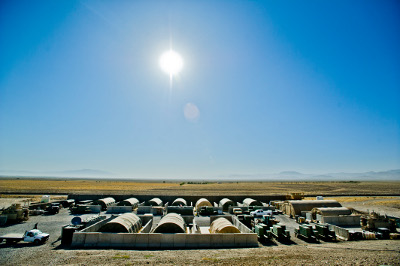Guest Columns
Afghanistan Exit
The long war in Afghanistan is about to end. Afghanistan will revert to status quo ante 9/11. Or will its new leaders build the peace they say they want?

Hello, this is Darrell Castle with today’s Castle Report. Today I will be talking about the agreement, signed February 29, 2020, between the Trump Administration and Taliban officials. A better name for this Report (Afghanistan Exit) might be “Gimme Three Steps”, like the old song by Lynyrd Skynyrd. But that wouldn’t help me on Google.
Get out of Afghanistan
It would probably be incorrect to call this a peace deal since it is a deal which simply allows the U.S. to leave Afghanistan. Peace? Well, maybe there will be peace after U.S. troops leave. But, if so, that would be an interruption of the last 200 years or so in that country. Afghanistan has been continually at war, nonstop for 40 years. That’s two generations without a single break. Nevertheless, after 19 years of U.S. involvement in the war I certainly welcome the deal that would bring U.S. participation to an end.
Dealing from weakness
I wonder if any of you folks have ever been involved in a business
deal of this kind. You are trying to sell an asset, which you
absolutely must sell by a certain date. Your opposite in the deal
knows you must sell. So the offer will never be what would otherwise
constitute a fair price. The buyer, in other words, knows you must
sell and will take advantage of your weakness. That is the U.S.
position in Afghanistan, especially with the release of the
Afghanistan papers
in December, which we talked about, and with this being a
presidential election year.
Editor’s Note
See also:
Timetable for leaving Afghanistan
So, the United States signed a deal last Saturday that purports to end the U.S. presence in Afghanistan. This after almost two decades of U.S. participation in the war. The agreement has a timetable for the withdrawal of American troops. That timetable starts with the current number of 13,000 and reduces that to 8,600 within 135 days. The entire 13,000 must be out within 14 months.
The deal has taken more than a year to complete. U.S. and Taliban officials periodically started and stopped negotiations for one reason or another. It was apparently negotiated and drafted from the U.S. side by Secretary of State Mike Pompeo. He was present at the signing but did not sign it. Signing for the U.S. was Special Representative for Afghanistan Reconciliation, Zalmay Khalizad, and for the Taliban, Mullah Abdul Ghani Baradar.
Fulfilling a promise
If the agreement were to be complied with, then all U.S. troops would eventually be coming home. President Trump hailed the deal as the fulfillment of his promise to get the U.S. out of endless no-win wars. He spoke directly with the Taliban leader by phone, the first American President to do so. Let’s look at the terms of agreement, but first, the costs of war after 19 years.
Costs of the Afghanistan War
You probably remember the early days after 9/11. Then there were basically two forces in a civil war in Afghanistan, the Taliban and the Northern Alliance. The Taliban’s harsh version of Sharia Law ran the country. The U.S. chose to enter the war on the side of the Northern Alliance, which meant war with the Taliban. The Taliban was essentially the same group which fought the Russians from 1979 to 1989 with US aid. The Russians suffered 15,000 dead before they finally withdrew.
U.S. and allied costs, financial and human
The cost for the U.S. to this point has been over 2,400 dead and over 20,000 wounded. NATO and non-NATO allied nations have suffered 1,100 dead and 8,000 wounded. The Department of Defense (D.O.D) estimates the financial cost of the war at $737 billion. But The New York Times Sunday March 1st edition lists it at $2 Trillion. That is the more accurate figure, if you have been following this war all along. It was, and is, easy to see the figures add up far beyond what D.O.D. says.
Costs to the people of Afghanistan
For the people of Afghanistan, the costs have indeed been high as well. More than 130,000 Afghan civilians dead, along with 29,000 Afghan soldiers and police. Taliban estimates of dead are between 20,000 and 35,000. The other cost that is not addressed in the deal is that Afghanistan would obviously be getting a new government. The current Afghan government, evolving from the Northern Alliance and supported militarily and financially by the U.S. for 19 years, was not included in the agreement.
So the U.S. negotiators drafted an agreement for the government of Afghanistan that did not mention that nation’s government. That can only mean that the U.S. knows, and publicly admits, that the moment U.S. troops are out, the U.S. backed government is also gone. If I were President Ashraf Ghani, I think I would take a trip to visit the billions I squirreled away in Dubai’s banks and never come back.
The prisoner problem
Failure to mention the Afghan government did cause one sticking point for adoption of the agreement, however. One of the deal breaker demands made by the Taliban was that 5,000 Taliban prisoners, held by the Afghan government, would go free. After the signing, the Afghan government said that since they were not a party to the agreement, they would not release the prisoners. The U.S. has no authority, according to President Ghani, to order the prisoners released. So he would not release them. The Taliban said no deal without the release. So the U.S. will, I’m sure, do what it always does, and that is buy their release. Regardless of the method, they will go free.
Afghanistan reverts to status quo ante
The agreement calls for the draw down of U.S. troops from 13,000 to 8,600 within 135 days, and complete withdrawal within 14 months. So, let’s just stop right there for a moment and contemplate this result. After 19 years of war, across three presidential administrations, and $2 trillion dollars expended, the best we can get is a negotiated way to leave. Everything goes back like it was before and Afghanistan is like we were never there. It was rubble then and its rubble now, except with a lot more dead. All those weird looking people with their weird dress and their weird laws and their weird relationship between men and women, and their weird religion, and their weird moonscape of a country, will be just as it was before. That projection is best case scenario for Afghanistan.
No economy, except the opium trade
We can’t even hope to gain from this deal what we did when we left Vietnam. Reason: there is no economy or potential economy as there was in Vietnam. We now have Most Favored Nation status with our old enemy, Vietnam. McDonald’s is the Vietnamese number one restaurant. But in Afghanistan they raise nothing but opium, apparently.
The Taliban want the war to end
We don’t have to wonder what the Taliban want out of this deal. The New York Times published their demands on February 20, 2020. The deputy leader of the Taliban, Sirajuddin Haqqani, wrote the article called “What We, the Taliban Want”. He said they, the Taliban didn’t expect any thing to come of the negotiating. But they decided to give it a chance once more. In his words,
The long war has had such a terrible cost for everyone that any chance to end it should be taken. Everyone is tired of war and I am convinced that the killing and maiming must stop.
Translation into plain English
In other words, we did not choose this war with the United States, but we were forced to defend ourselves. The withdrawal of foreign forces from Afghanistan is our first and foremost demand. We have worked tirelessly for over 18 months to bring about this agreement, despite the intensifying bombing campaign by the United States against our villages, and despite the constantly moving goalposts of the American side. We Afghans suffer the most if the war continues. So even when President Trump called it off, we kept the talks going.
A desire for peace
We are aware of the concern in and out of Afghanistan regarding what kind of government Afghanistan will have. Our answer is that it depends on the consensus of the Afghan people. We are confident that, liberated from foreign domination, we can find a way to build an Islamic system where all have equal rights and the rights of women to education and to work are protected.
There are warmongering groups on all sides of the war. It is not in our best interests to allow those groups to disrupt the peace process. We will take all necessary steps to ensure that the new Afghanistan is a bastion of stability and no group feels threatened on our soil. I am confident that if we can reach an agreement with our foreign enemy, we can resolve our intra-Afghan problems through talks. The New Afghanistan will not exist in isolation but will be a part of the international community.
Trust?
In negotiating this agreement and putting it into force a degree of trust has been reached between us and the United States. We are fully committed to carrying out every provision of the agreement, and thereby earning lasting peace. But it will depend on the United States being equally scrupulous in its observance of the terms of agreement.
Those were the words of the Deputy leader of the Taliban, Mr. Haqqani, with some paraphrase and editing for brevity by me. Pretty impressive statement and it makes one think that real peace just might be possible. The man who wrote that article for The New York Timeshas probably known nothing but war and bombing, killing and dying in his country his whole life. It’s not hard to believe that he would like to see an end to it.
Areas of concern in and out of Afghanistan
He addressed in his article the main points of contention and the demands of each. The Taliban want the U.S. gone completely. That means civilian contractors as well as military. They want their prisoners released by the Afghan government and they believe they can handle the rest. The U.S. wants an exit strategy with certain provisions. The Taliban must do what it can to prevent groups, such as al Qaeda, and ISIS, from setting up bases from which to attack the West. The U.S. is also concerned about the influence of China, Russia, and Iran once U.S. troops are gone. Finally, the U.S. believes it must express concern for the rights of Afghan women.
What can the secret annexes be?
All these things were addressed by the agreement and Mr. Haqqani mentioned them in his article. The one thing not addressed by his article, but which is mentioned in the agreement, is a reference to “secret annexes.” These are apparently items that the sides agree to but for one reason or another they will not make public. That says C.I.A. to me. It probably requires some form of C.I.A. continued presence after the main items of the agreement are complied with.
Afghan government will likely fall
Interesting as well is the fact that the agreement does not require the Taliban to stop attacking the Afghan government. Its obvious that the Afghan government could not survive a week without U.S. military and financial support. So I guess the intent is to let it appear to be irrelevant. Will the U.S. remove sanctions against the Taliban and stop intervening in the affairs of the Taliban? Maybe, I’m not sure from the face of the agreement, but perhaps it appears in one of the secret annexes.
A great monument of history?
According to The New York Times, this agreement is widely seen by the Taliban as a great victory. Once again, a rag tag bunch of civilian fighters fought the world’s greatest military to a standstill. Further, they forced it to abandon $2 trillion dollars and thousands of dead. It’s an old story line now. A determined enemy fighting on its home turf with its own sacred soil under it’s feet can bring the world’s greatest high tech power to the point of seeking terms. The Taliban negotiator said that the Sheraton Hotel in Doha, Qatar, where the deal was signed, would become a great monument of history.
Can Afghanistan change?
In conclusion, as far as the United States is concerned, Afghanistan is hopeless. There is and never was anything to gain worthy of the cost in Afghanistan. It is a hopeless, 7th century land mired in and dominated by a medieval religious movement that simply will not allow progress. Growing opium and raising goats is about the best Afghanistan can do.
That’s why the words of Mr. Haqqani were so encouraging. There is a tone that says these people are trying to change 200 years of history and build a country that is more than a battleground for foreign armies. I wish them all the best in their quest to do that. In the meantime, I certainly hope that not one more American dies there.
Doubts for peace
Not everyone wants peace, however. Just last night twenty Shiites were killed in an attack. That attack could have been to disrupt the peace process. Or it is just a resumption of 1,200 years of Shia—Sunni hatred. Afghanistan is lost and we will certainly never be able to find it.
Conclusion
Finally, folks, three presidents now share the guilt of this debacle. So there’s plenty of blame to spread around. I could draft an acceptable agreement that does the same thing as this agreement in two minutes. How about this: We want to leave. If we can do so safely, we will give you money and pretend none of the last 19 years happened. “Just gimme three steps toward the door, gimme three steps, mister, and you won’t see me no more.” My apologies to Lynyrd Skynyrd.
At least that’s the way I see it,
Until next time folks,
This is Darrell Castle.
About the image
This photo of Camp Etchberger, home of Detachment 1, 73rd EACS. U.S. Air Force, appears courtesy of the U.S. Air Force. Master Sgt. Jeffrey Allen, USAF, took this photo.
Darrell Castle is an attorney in Memphis, Tennessee, a former USMC Combat Officer, 2008 Vice Presidential nominee, and 2016 Presidential nominee. Darrell gives his unique analysis of current national and international events from a historical and constitutional perspective. You can subscribe to Darrell's weekly podcast at castlereport.us
-

 Accountability3 days ago
Accountability3 days agoWaste of the Day: Principal Bought Lobster with School Funds
-

 Executive1 day ago
Executive1 day agoHow Relaxed COVID-Era Rules Fueled Minnesota’s Biggest Scam
-

 Civilization9 hours ago
Civilization9 hours agoWhy Europe Shouldn’t Be Upset at Trump’s Venezuelan Actions
-

 Constitution2 days ago
Constitution2 days agoTrump, Canada, and the Constitutional Problem Beneath the Bridge
-

 Civilization1 day ago
Civilization1 day agoThe End of Purple States and Competitive Districts
-

 Christianity Today8 hours ago
Christianity Today8 hours agoSurprising Revival: Gen Z Men & Highly Educated Lead Return to Religion
-

 Civilization5 days ago
Civilization5 days agoThe devil is in the details
-

 Executive21 hours ago
Executive21 hours agoWaste of the Day: Can You Hear Me Now?













All I can say about the peace deal is that I hope we at least did it in such a manner that ensures we DON’T end up having to return.
Last time we were involved in Afghanistan was during the Soviet-Afghan war. After we successfully drove the Soviets out, we left the Afghanis to their own devices, then they “repaid” our help by doing the 1993 World Trade Center bombings, which eventually escalated to 9/11. I’d rather we make sure we don’t have a repeat of that situation where we end up going back to Afghanistan yet again if we’re to do a peaceful exit and peace treaty.
Otherwise, no deal for me.
[…] also this article and others Mr. Castle has written before about […]